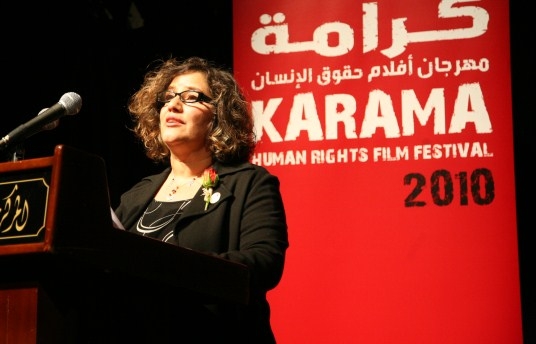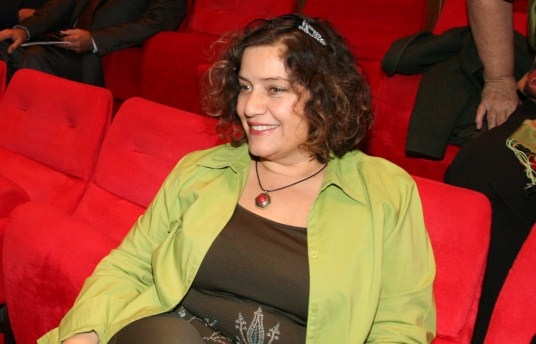People In Film: Sawsan Darwaza
Apr 24, 2011

Sawsan Darwaza is a theatre and film director who works on collective projects. She started her career as a filmmaker, introducing the audio-visual medium of film and video within her theatre pieces, and is now director and managing partner of a production company named Mir’at Media Productions in Amman, Jordan, as well as the creative director of Al Ma3mal 612 Think Factory. Born in Syria, she spent a large part of her life in Beirut and Damascus, where she studied theatre and French literature until 1984. In 1985 she moved to Amman and worked as an independent producer and director, producing, writing and directing more than fifteen plays. Working on a major television series of documentaries about theatre artists in the Arab world, she entered into a new world of encountering the realm of different artists. She achieved fifty-two one-hour films with a range of Arab artists and intellectuals under the umbrella of the ongoing series ‘An Artist with a View’, or ‘Haoula’a Alakharoun’ (1996 – 2003), which is played on the majority of Arab satellite stations. She is also the president of the International Theatre Institute (ITI) (UNESCO)/ Jordan Centre and the head director of Karama Human Rights Film Festival. Watch her work here:
video#2
DFI: Thank you for speaking to DFI, Sawsan! You have covered a lot of different roles in your career, from theatre to directing to video productions. Where do you find yourself more?
Sawsan: They are interrelated: I direct films and documentaries through my vision of life, with theatre and drama being my base. However, each project has its own merits and necessities in defining its own medium, whether it’s theatre, TV, film, or a piece of installation that uses many visual disciplines, including film projections.
DFI: Your documentaries deal with different current issues in the Middle East, and some of them are rather daring. What do you prefer to highlight through your work?
Sawsan: It is true – most of them are social examinations of the current situation, and these examinations drive both the cast of the film and the spectator to formulate a political statement and a realization which works as a catalyst for change.
DFI: Is there any specific work that means a lot to you, and if so, why?
Sawsan: My film ‘Borderland’ tackles a very sensitive issue: yes, it is a documentary, but it is also a turbulence of emotions. The key players of the film were Arab artists in Europe with problems finding their identities. I was keen not only on representing this group of artists, but also a large part of our Arab community. The idea of an identity became so controversial that we became aggressive and defensive towards it. I was happy that most of the Arab expats, following our on-camera conversations, returned to their countries with cultural projects and a mission.
video#1
DFI: Do you have any new projects coming up that you would like to tell us about?
Sawsan: I’m currently working on the rehabilitation of Al-Khayam cinema house, which is an old cinema situated in downtown Amman. The project is a huge endeavour and is still in the beginning stages. As a thinker and worker in Ma3mal 612 Think Factory, myself and others decided to create a pool of artists from different disciplines that could join in our think factory and start the Al-Khayam cinema project. It will be the home station of all Jordanian artists, and will hopefully enable collaborations with other talents worldwide.
DFI: How is the current political situation in the Middle East affecting artists? As a filmmaker, do you feel involved in it, and if so, how?
Sawsan: The current political situation in the Middle East has frozen many of the ongoing projects because the filmmakers found themselves undertaking new priorities. This is a phase of contemplation. Filmmakers that are friends of mine were in the midst of both the Tunisian and Egyptian revolutions, and they have not yet released related projects or films. But the situation is very inspiring and the moment is historical. I feel that I want to enhance a new Arab genre of revolutionary films and have been frustrated in not finding the means to do so. This is how we found ourselves in Ma3mal 612 Think Factory, by inviting young filmmakers and activist artists to document what is happening in Jordan as a start; by relating it to the Arab world, then analysing it through debate and examination. Hopefully, that might be a new project coming up soon.

Sawsan Darwaza
DFI: You are currently the director of Karama Human Rights Film Festival. Can you tell us how it all started and what the purpose of the festival is?
Sawsan: Karama Human Rights Film Festival was founded in 2009 by cinema director Ehab Al-Khatib and myself, and we were later joined by media expert Ayman Bardaweel. The idea behind it was that there were no human rights categories in Arab film festivals, even though most Arab films were falling under this theme – even if it was a love story – considering the controversial and pressure point situations occurring in the Middle East. It was also very important, even vital, to expose our communities to their fundamental rights through film.
DFI: Do you feel exposing human rights films and themes at the festival affected the audience?
Sawsan: Cultural activities, such as panel discussions and music and theatre performances, all played an active role in engaging the community. The films that were shown in the festival, as well as the speakers, spoke of dignity and self-expression as a vital right for every human, hence giving a deeper understanding to the right to seek change. The audience was very enthusiastic to an extent: they were hungry to know more and wanted to be a part of making of this festival what it was. It not only opened the eyes and minds of the people, but it also brought them together through a learning and observational process.
DFI: What are the main challenges you feel you have faced in your career?
Sawsan: One of the most recent challenges I faced was the responsibility the Karama Human Rights Film Festival put upon us as a team. All of a sudden, we found ourselves being asked for solutions to many different problems: we became role models for the people of our community, even though the project isn’t yet completely matured. Another challenge for me is to find Arab funds that could engage the support of our artistic and film projects. Usually, we are obliged to find support within foreign funds, but often they come with conditions that don’t match the nature of our projects. There should definitely be more focus on encouraging Arab cinema and filmmakers.
DFI: How have you seen filmmaking develop in the last 10 years? And in terms of filmmaking, do you feel there’s hope for the future for the Middle East?
Sawsan: If we find a way to overcome the local funding challenges then yes, I see Arab filmmaking taking a huge role in the Middle East. After these political changes I believe that other parts of the world are ready to receive both our fiction and documentary films, as they have developed a thirst for, and want to know more about, the Middle East. It’s almost as if they have a sort of shame that they have contributed to the making of the dictatorships, and feel a responsibility to see art in a more democratic way for the entire globe. All these factors should be used to develop the Arab filmmaking industry in the future, and rapidly.
DFI: If you were to give your advice to young filmmakers, what would it be?
Sawsan: This is your time to prosper, to develop, and to become a part of something bigger. Engage more with your community and become one with it instead of limiting yourself to your own story – always go back to the fundamental questions that you think are left unresolved, and through your artistic journey answer these questions with your art.